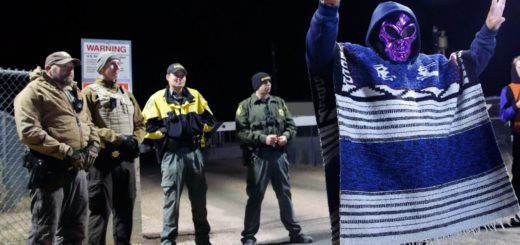Why we might not get a coronavirus vaccine

Politicians have become more cautious about immunisation prospects. They are right to be
It would be hard to overstate the importance of developing a vaccine to Sars-CoV-2 – it’s seen as the fast track to a return to normal life. That’s why the health secretary, Matt Hancock, said the UK was “throwing everything at it”.
But while trials have been launched and manufacturing deals already signed – Oxford University is now recruiting 10,000 volunteers for the next phase of its research – ministers and their advisers have become noticeably more cautious in recent days.
This is why.
Why might a vaccine fail?
Earlier this week, England’s deputy chief medical officer Jonathan Van-Tam said the words nobody wanted to hear: “We can’t be sure we will get a vaccine.”
But he was right to be circumspect.
Vaccines are simple in principle but complex in practice. The ideal vaccine protects against infection, prevents its spread, and does so safely. But none of this is easily achieved, as vaccine timelines show.
More than 30 years after scientists isolated HIV, the virus that causes Aids, we have no vaccine. The dengue fever virus was identified in 1943, but the first vaccine was approved only last year, and even then amid concerns it made the infection worse in some people. The fastest vaccine ever developed was for mumps. It took four years.
Scientists have worked on coronavirus vaccines before, so are not starting from scratch. Two coronaviruses have caused lethal outbreaks before, namely Sars and Mers, and vaccine research went ahead for both. But none have been licensed, partly because Sars fizzled out and Mers is regional to the Middle East. The lessons learned will help scientists create a vaccine for Sars-CoV-2, but there is still an awful lot to learn about the virus.
A chief concern is that coronaviruses do not tend to trigger long-lasting immunity. About a quarter of common colds are caused by human coronaviruses, but the immune response fades so rapidly that people can become reinfected the next year.
Researchers at Oxford University recently analysed blood from recovered Covid-19 patients and found that levels of IgG antibodies – those responsible for longer-lasting immunity – rose steeply in the first month of infection but then began to fall again.
Last week, scientists at Rockefeller University in New York found that most people who recovered from Covid-19 without going into hospital did not make many killer antibodies against the virus.
“That’s what is particularly challenging,” says Stanley Perlman, a veteran coronavirus researcher at the University of Iowa. “If the natural infection doesn’t give you that much immunity except when it’s a severe infection, what will a vaccine do? It could be better, but we don’t know.” If a vaccine only protects for a year, the virus will be with us for some time.
The genetic stability of the virus matters too. Some viruses, such as influenza, mutate so rapidly that vaccine developers have to release new formulations each year. The rapid evolution of HIV is a major reason we have no vaccine for the disease.
So far, the Sars-CoV-2 coronavirus seems fairly stable, but it is acquiring mutations, as all viruses do. Some genetic changes have been spotted in the virus’s protein “spikes” which are the basis of most vaccines. If the spike protein mutates too much, the antibodies produced by a vaccine will effectively be out of date and might not bind the virus effectively enough to prevent infection.
Martin Hibberd, professor of emerging infectious diseases at the London School of Hygiene and Tropical Medicine, who helped identify some of the virus’s mutations, called them “an early warning”.
Another challenge: making any vaccine safe
In the rush to develop a vaccine – there are now more than 100 in development – safety must remain a priority. Unlike experimental drugs for the severely ill, the vaccine will be given to potentially billions of generally healthy people.
This means scientists will have to check extremely carefully for signs of dangerous side-effects. During the search for a Sars vaccine in 2004, scientists found that one candidate caused hepatitis in ferrets. Another serious concern is “antibody-induced enhancement” where the antibodies produced by a vaccine actually make future infections worse. The effect caused serious lung damage in animals given experimental vaccines for both Sars and Mers.
John McCauley, director of the Worldwide Influenza Centre at the Francis Crick Institute, says it takes time to understand the particular challenges each vaccine throws up. “You don’t know the difficulties, the specific difficulties, that every vaccine will give you,” he says. “And we haven’t got experience in handling this virus or the components of the virus.”
We should ‘end up with something’ … but what does that mean?
When the prime minister, Boris Johnson, told a No 10 press briefing that a vaccine was “by no means guaranteed”, his chief scientific adviser, Patrick Vallance, agreed, but added: “I’d be surprised if we didn’t end up with something.” Many scientists share that view.
In all likelihood, a coronavirus vaccine will not be 100% effective.
Those in development draw on at least eight different approaches, from weakened and inactivated viruses to technologies that smuggle genetic code into the recipient’s cells, which then churn out spike proteins for the immune system to make antibodies against.
Ideally, a vaccine will generate persistent, high levels of antibodies to wipe out the virus and also “T” cells to destroy infected cells. But each vaccine is different and today no one knows what kind of immune response is good enough.
“We don’t even know if a vaccine can produce an immune response which would protect against future infection,” says David Heymann, who led the response of the World Health Organization (WHO) to the Sars epidemic.
Early results from two frontrunner vaccines suggest they might have some use.
The US biotech firm Moderna reported antibody levels similar to those found in recovered patients in 25 people who received its vaccine.
Another vaccine from Oxford University did not stop monkeys contracting the virus, but did appear to prevent pneumonia, a major cause of death in coronavirus patients.
If humans react the same way, vaccinated people would still spread the virus, but be less likely to die from it.
How well a vaccine works determines how it is used. Armed with a highly effective vaccine that protects for several years, countries could aim for herd immunity by protecting at least two-thirds of the population.
Coronavirus patients pass the virus on to three others, on average, but if two or more are immune, the outbreak will fizzle out. That is the best-case scenario.
More likely is we will end up with a vaccine, or a number of vaccines, that are only partially effective.
Vaccines that contain weakened strains of virus can be dangerous for older people, but might be given to younger people with more robust immune systems to reduce the spread of infection.
Meanwhile, older people might get vaccines that simply prevent infections progressing to life-threatening pneumonia. “If you don’t have the ability to induce immunity, you’ve got to develop a strategy for reducing serious outcomes of infection,” says McCauley.
But partially effective vaccines have their own problems: a vaccine that doesn’t stop the virus replicating can encourage resistant strains to evolve, making the vaccine redundant.
So, is the virus here to stay?
The simple answer is: yes.
Hopes for eliminating the virus start with a vaccine but do not end there. “If and when we have a vaccine, what you get is not rainbows and unicorns,” says Larry Brilliant, CEO of Pandefense Advisory, who led the WHO’s smallpox eradication programme. “If we are forced to choose a vaccine that gives only one year of protection, then we are doomed to have Covid become endemic, an infection that is always with us.”
The virus will still be tough to conquer with a vaccine that lasts for years.
“It will be harder to get rid of Covid than smallpox,” says Brilliant. With smallpox it was at least clear who was infected, whereas people with coronavirus can spread it without knowing. A thornier problem is that as long as the infection rages in one country, all other nations are at risk.
As David Salisbury, the former director of immunisation at the Department of Health, told a Chatham House webinar recently: “Unless we have a vaccine available in unbelievable quantities that could be administered extraordinarily quickly in all communities in the world we will have gaps in our defences that the virus can continue to circulate in.”
Or as Brilliant puts it, the virus will “ping-pong back and forth in time and geography”.
One proposal from Gavi, the vaccine alliance, is to boost the availability of vaccines around the world through an “advance market commitment”. And Brilliant believes some kind of global agreement must be hammered out now. “We should be demanding, now, a global conference on what we’re going to do when we get a vaccine, or if we don’t,” he says.
“If the process of getting a vaccine, testing it, proving it, manufacturing it, planning for its delivery, and building a vaccine programme all over the world, if that’s going to take as long as we think, then let’s fucking start planning it now.”
How will we live with the virus?
People will have to adapt – and life will change. Heymann says we will have to get used to extensive monitoring for infections backed up by swift outbreak containment. People must play their part too, by maintaining handwashing, physical distancing and avoiding gatherings, particularly in enclosed spaces. Repurposed drugs are faster to test than vaccines, so we may have an antiviral or an antibody treatment that works before a vaccine is available, he adds. Immediate treatment when symptoms come on could at least reduce the death rate.
Yuen Kwok-yung, a professor of infectious disease at the University of Hong Kong, has advised his government that all social distancing can be relaxed – but only if people wear masks in enclosed spaces such as on trains and at work, and that no food or drink are consumed at concerts and cinemas.
At restaurants, tables will have to be shielded from each other and serving staff will follow strict rules to prevent spreading the virus. “In our Hong Kong perspective, the diligent and correct use of reusable masks is the most important measure,” he says.
Sarita Jane Robinson, a psychologist who studies responses to threats at the University of Central Lancashire, says people are still adapting to the “new normal” and that without more interventions – such as fines for not wearing face masks – “we could see people drifting back to old behaviours”.
We might become blase about Covid-19 deaths when life resumes and the media move on, but the seriousness of the illness will make it harder to ignore, she says.
Has the coronavirus pandemic made us all nicer?
Read more
One last possibility could save a lot of trouble. Some scientists wonder whether the common cold coronaviruses crossed into humans in the distant past and caused similar illness before settling down. “If the virus doesn’t change there’s no reason to think that miraculously in five years’ time it won’t still cause pneumonia,” says Perlman. “But that’s the hope: that we end up with a much more mild disease and you only get a bad cold from it.”
Heymann says it is too soon to know how the pandemic will pan out. “We don’t understand the destiny of this virus,” he says. “Will it continue to circulate after its first pandemic? Or will it, like some other pandemic viruses, disappear or become less virulent? That we do not know.”



 Creators of mankind
Creators of mankind Description of “Tall white aliens”
Description of “Tall white aliens” Where they came from?
Where they came from? About hostile civilizations
About hostile civilizations The war for the Earth
The war for the Earth “Tall white aliens” about eternal life
“Tall white aliens” about eternal life Video: “Nordic aliens”
Video: “Nordic aliens” Aliens
Aliens Alien encounters
Alien encounters The aliens base
The aliens base UFO
UFO Technology UFO
Technology UFO Underground civilization
Underground civilization Ancient alien artifacts
Ancient alien artifacts Military and UFO
Military and UFO Mysteries and hypotheses
Mysteries and hypotheses Scientific facts
Scientific facts


















